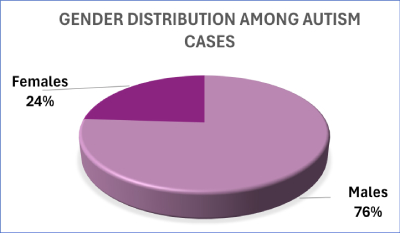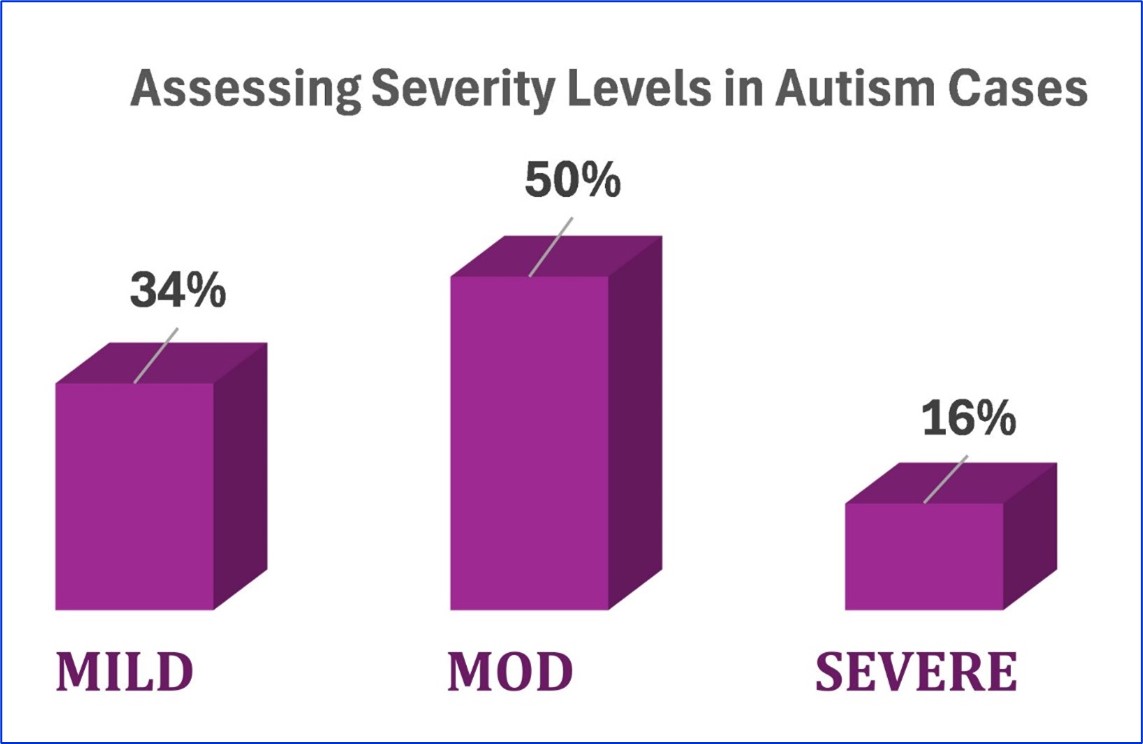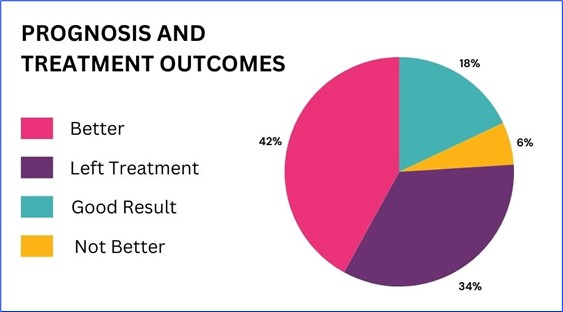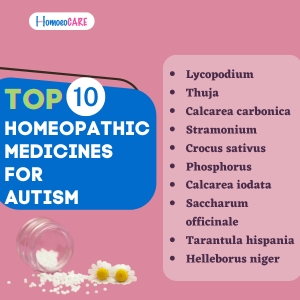
Welcome friends, to this critical discussion on the reversal of autism, marking the conclusion of years of dedicated research and clinical experience. Over the past 10 years, I've explained various aspects of the management of autism through my videos on my youtube channel, helping parents to understand
However, today's blog is especially significant as I disclose the findings of our extensive research covering six years of homeopathic treatment of autism in our clinics, treating patients both offline and online homeopathic consultation.
Autism, also referred to as autism spectrum disorder (ASD), is a neurodevelopmental disorder characterized by a diverse range of symptoms. The term "spectrum" denotes the variability in symptoms and its presentation among different children with autism. This variability prompted the DSM (Diagnostic and Statistical Manual of Mental Disorders) to categorise autism under a broad spectrum, recognising the unique traits and challenges shown by every child.
When approaching autism treatment, understanding the specific type and severity of autism in each child is vital. ASD is categorised into 2 main categories primary and secondary autism based on the origin of symptoms and their severity levels. Primary Autism suggests that the symptoms of Autism are present from birth, while Secondary Autism manifests after a period of apparently normal development, typically around 18 months of age and after this age, the child shows regression.
Identifying whether a child shows Primary Autism or Secondary Autism helps in fine-tuning the treatment options. Primary Autism, which originates from birth, often correlates with factors such as prenatal stresses, maternal health during pregnancy, or genetic predispositions. Secondary autism, on the other hand, may start from triggers such as environmental factors, postnatal stresses, or adverse reactions to vaccinations.
Our research went into the characteristics and outcomes of 350 autism cases which were treated both offline and online homeoapthic consultation over six years. Here are some of the key points collected from our analysis:
.jpg)


Maternal Health and Delivery: Additionally, we investigated the labor and pregnancy history of these cases. Our findings revealed that in almost 64% of the cases, mothers underwent delivery via C-section, while 36% had a normal delivery. These findings, along with other smaller research points, have contributed to our better understanding of autism and its probable causes, and the importance of guiding future mothers to be aware of these factors to prevent autism from its inception. (Research have demonstrated impact of maternal stress on brain development)
.jpg)
Identifying Probable Causes: Now, a very important point to consider is that we endeavour to identify the major causes of autism. In Homeopathy, we also recognize the emotional factor as one of the most significant contributors to autism. Therefore, we attempt to determine the various causes of autism (ailments from) and compare them to primary and secondary autism.
a) Screen Exposure
We analyzed the prevalence of certain factors like screen time exposure and differentiated between primary and secondary autism cases. We observed that only 3% of the children with primary autism had a history of excessive screen time exposure, whereas in secondary autism cases, this figure was significantly higher at more than 43%. This shows that during the pandemic, when the parents were busy with work from home, and no one to take care of the child, he was given plenty of screen time, and hence we have seen a 7-fold jump in autism cases post-pandemic.
b) Emotional Factors
Another notable factor we investigated was the feeling of being forsaken during pregnancy. This could manifest when the mother felt neglected, alone, or unsupported due to various family problems, such as the husband being away for work in a different city. We found that 25% of primary autism cases were associated with such feelings during pregnancy, whereas only 16% of secondary autism cases showed similar associations.
c) Fear
Furthermore, we investigated other potential triggers such as maternal fear during pregnancy and the history of vaccination. We observed that 14% of primary autism cases were associated with maternal fear, while only 9% of secondary autism cases showed similar associations. We also considered other emotional factors like separation, illness, anger, grief, or financial stress and compared its results with primary and secondary autism. Extreme emotional turbulence during the second trimester has a significant impact on autism in children.
d) Hypoxia during Labor
Additionally, we explored the occurrence of hypoxia during labor, which occurs when the child experiences a lack of oxygen during delivery, leading to an impact on the brain. We found that 27% of primary autism cases were linked to hypoxia, indicating that primary autism is more commonly associated with this factor compared to secondary autism.
e) Vaccinations
We found that vaccination had minimal association with primary autism, with only 3% of cases having a history of vaccination. However, in secondary autism cases, approximately 12% had a history of bad effects of vaccination.
f) Antibiotics and other medications
We examined the potential impact of antibiotics and other allopathic medicines given during pregnancy or in the early stages of childhood. It was observed that side effects of allopathic medications were seen in 5% of secondary autism cases and 3 % in Primary autism cases.
This comprehensive understanding of the various percentages of the causes of autism observed in our clinics provides valuable insights for further research and guidance for future parents to prevent autism from its inception.
This detailed understanding is an eye-opener for us in managing Autism and reversing Autism. Now we know what are the major causes, and we are guiding parents and expectant mothers on how to manage their pregnancies to potentially prevent autism in their child.
Another crucial point is about the prognosis in autism cases. Many people believe that autism cannot be helped, and some even argue that autism is not a disease. We're not here to debate whether autism is a disease or a disorder, as classified by the DSM. Instead, we're focused on helping every child with autism. Our motto is “From Dependence to Independence.”
The results of our study were surprising and encouraging. Despite the belief that autism is incurable, we have found that almost 42% of the cases in our clinic showed significant improvement in symptoms of Autism. This is a very good number and this demonstrates that Autism can get better. However, 34% of the patients did not continue their treatment, which is a big concern. I urge all parents not to discontinue treatment prematurely due to doubts or external opinions, and be misguided with others. Consistent treatment can lead to significant improvement in your child with Autism.
Additionally, 18% of the cases showed remarkable results in Reversing Autsim, with almost a complete reversal of autism symptoms. If you combine both these figures, then nearly 60% of the patients in our clinic showed significant improvement or near-reversal of symptoms. Only 6% did not show improvement, which is a relatively small number.

I do not claim to have a cure for autism for all patients, but our goal is to provide the maximum possible help to these children and achieve the best possible results in Autism. We are pleased to report that our efforts have led to a better understanding and significant improvements in many cases.
This research is crucial, and we are excited to share these findings with every parent. We hope that this information can help educate others and encourage parents to consider homeopathy as a major alternative treatment for autism.
While each case requires individualized treatment, certain homeopathic remedies have shown efficacy in managing autism symptoms. Our analysis identified the following as commonly prescribed remedies:

It's important to note that these remedies serve as only reference points and do not guarantee efficacy in every case. Every case is different and must be handled differently. It is advisable to contact the best homeopathic doctor for autism near you, for homeopathic treatment for autism.
Our research on autism offers a ray of hope for families suffering from the trauma. By understanding the complexities of autism and adopting a personalized homeopathic treatment, significant improvements and even reversals of symptoms are achievable. I urge every parents to remain persistent in their pursuit to help their child with autism and to explore homeopathy as a viable option for autism management.
Together, let's spread this awareness of autism and adopt a supportive environment for every child. If you have any questions or concerns regarding autism, please feel free to contact the best homeopathic doctor for autism.
Copyright ©2021 Homoeocare